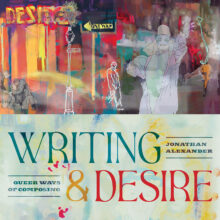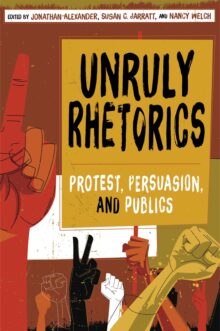

Jonathan Alexander
Jonathan Alexander is Chancellor’s Professor of English and Informatics at the University of California, Irvine, where he also served as the founding director of the Center for Excellence in Writing and Communication and currently directs the Humanities Core Program. He is the author, coauthor, or coeditor of twenty-two books, and in 2023 he was given the Exemplar Award by the Conference on College Composition in Communication in recognition of career achievements.
Writing and Desire
Queer Ways of Composing
Writing and Desire is a sustained, multimovement exploration of how writers, particularly queer writers, think and feel through desire as central to their writing practice. In a time of political, social, global, and ecological unrest, how might we understand desire—the desire for things to be different, the desire for a better world—as a crucial dimension of contemporary human experience? What might such a recentering of desire offer us, personally and politically? And how is writing itself, as one of the primary ways through which we express and explore ourselves, central to the expression and exploration of desire? Drawing on recent theoretical work in queer theory and the new materialism, Jonathan Alexander studies a range of queer and trans writers and artists who center desire in their practice and argues that conceptualizing writing as desire allows us to reexperience both writing and our world as saturated with our dreams and wishes for change. In a book both elegant and unsettling, and by turns personal, analytic, and experimental, Alexander challenges us—and himself—to think about desire and writing as the deepest manifestation of our hopes for the future.
Unruly Rhetorics
Protest, Persuasion, and Publics
What forces bring ordinary people together in public to make their voices heard? What means do they use to break through impediments to democratic participation?
Unruly Rhetorics is a collection of essays from scholars in rhetoric, communication, and writing studies inquiring into conditions for activism, political protest, and public assembly. An introduction drawing on Jacques Rancière and Judith Butler explores the conditions under which civil discourse cannot adequately redress suffering or injustice. The essays offer analyses of “unruliness” in case studies from both twenty-first-century and historical sites of social-justice protest. The collection concludes with an afterword highlighting and inviting further exploration of the ethical, political, and pedagogical questions unruly rhetorics raise. Examining multiple modes of expression – embodied, print, digital, and sonic – Unruly Rhetorics points to the possibility that unruliness, more than just one of many rhetorical strategies within political activity, is constitutive of the political itself.


